Chatting with JOHN C. McGINLEY on one of the hottest days of the year seems very appropriate given the acting hot streak that John has been on for many years now. Possibly best known for his nine years as Dr. Perry Cox on the hit comedy Scrubs, McGinley has consistently graced film, television, stage, and commercials for the past almost 40 years. He has done everything and played virtually every character type possible in films like Fat Man and Little Boy, The Rock, Car 54 Where Are You?, Point Break, Article 99, Get Carter, Platoon, Wall Street, The Good Catholic, 42, The Belko Experiment, and now BENCHED, not to mention his television work and voicing in shows like Robot Chicken, Justice League Unlimited, Burn Notice, The Practice, Spenser For Hire, and yes, even an early debut on the soap opera Another World, or his stage work in productions like Requiem for a Heavyweight and Mamet’s Glengarry Glen Ross.
Seemingly always working, as evidenced by his roles, although sometimes punctuated or to the opposite extreme, John is an “everyman”, but that’s also who he is in real life. When we spoke, he had just wrapped up the family grocery shopping and was driving home in his truck while chatting with me on the phone. A family man who buys his own groceries? That speaks volumes right there about John C. McGinley. But then you start talking about his career, his work ethic, specific roles, and particularly his new film BENCHED, not to mention his Down’s Syndrome advocacy, the admiration and respect for John just grows in leaps and bounds. He is a genuinely nice guy who cares about his craft, about the next generation of actors and performers, about his family, about giving back, and caring for those less fortunate than himself. And it all comes from the heart.
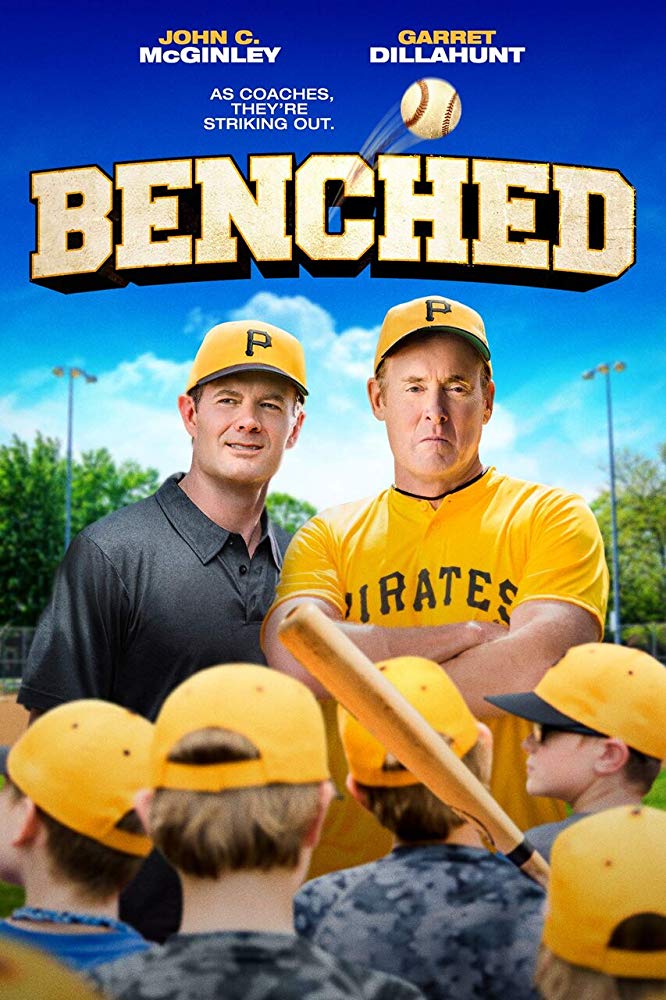
With release timed perfectly to the World Series Little League Championships currently happening in Williamsport, Pennsylvania, in his latest film, BENCHED, John plays a Little League coach. Gruff and seemingly a nightmare hard-ass of a coach who only cares about winning, it doesn’t take long to see the nuance that John brings to the role of Coach Don, humanizing the character and elevating the messaging and context of the entire film. Joining him on the field as Assistant Coach Mike, a man who knows nothing about baseball, is Garret Dillahunt. Both men are parents. Both love their sons. Both have a different outlook and approach to life. And both have a journey to find understanding for each other and others around them. Directed by Robert Deaton and Geroge Flanigan with script by Robert Dressen based on his own 2003 play of the same name, McGinley and Dillahunt both soar. Their chemistry is solid and they play effectively off one another. But what truly shines for both actors is their interaction with their young Little League playing co-stars. Watching each man infuse their respective character with different tact and approach, but with the same goal in mind, is a testament to the skill of both McGinley and Dillahunt. And going beyond performance and looking at the film from a production standpoint, the story is well structured and visually engaging, embracing the motifs and structure of a baseball game.
Casual, fun, energetic, enthusiastic, insightful, heartfelt, and rounding all the bases covering a gamut of topics, JOHN C. McGINLEY demonstrates why he’s in a league of his own . . .
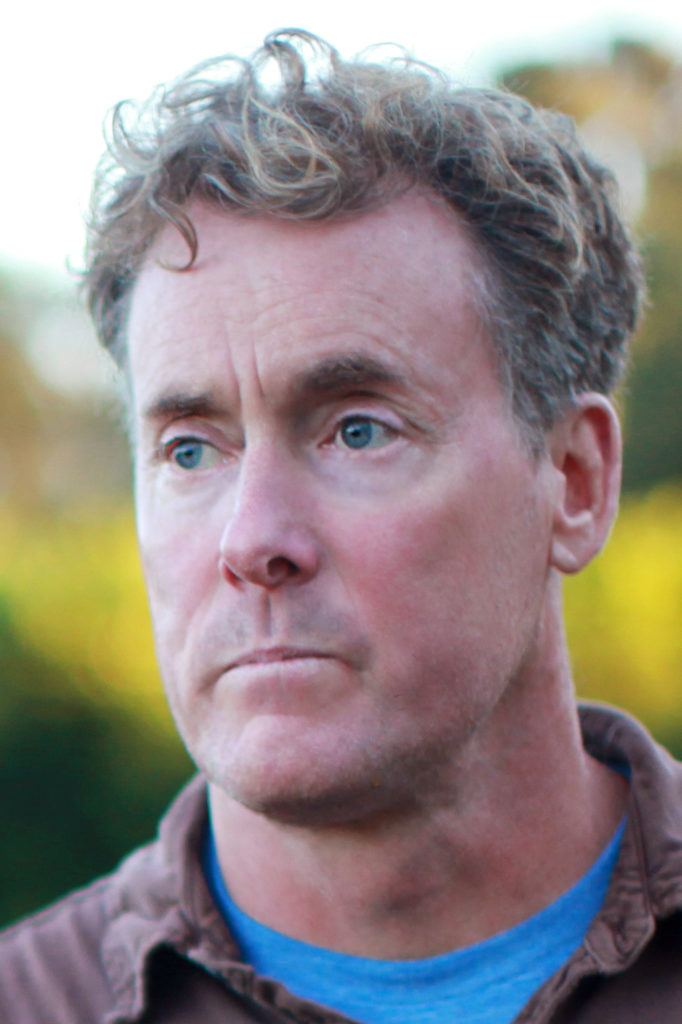
I have been such an admirer of yours for so long, John. I think the first role that you did that I absolutely fell in love with you in was Article 99 with Kiefer [Sutherland] and Ray [Liotta].
Oh, it was one of my favorites!
I love that! I can’t tell you how many times I have watched that film over the years.
You know, the funny part about that gig was that when Orion was really a vibrant producer of films, they had already cast me as the co-lead in Car 54, Where Are You?“. Then I went in to audition for Howie Deutch for Article 99 to play that delicious role, and I got both films. And because it was Orion, Mark Platt, who’s been a huge supporter of mine for a long time, he said, “We’ll work out the schedule. So you’ll leave Toronto every Thursday night, last flight out, for three weeks of the overlap. You’ll shoot Friday and Saturday in Kansas City, and then you’ll fly back to Toronto Sunday, and you’ll do that for three weeks. And then you’ll be wrapped on Car 54, Where Are You? and you can finish up Article 99.” That sounds chaotic, but it really wasn’t. It was heaven.
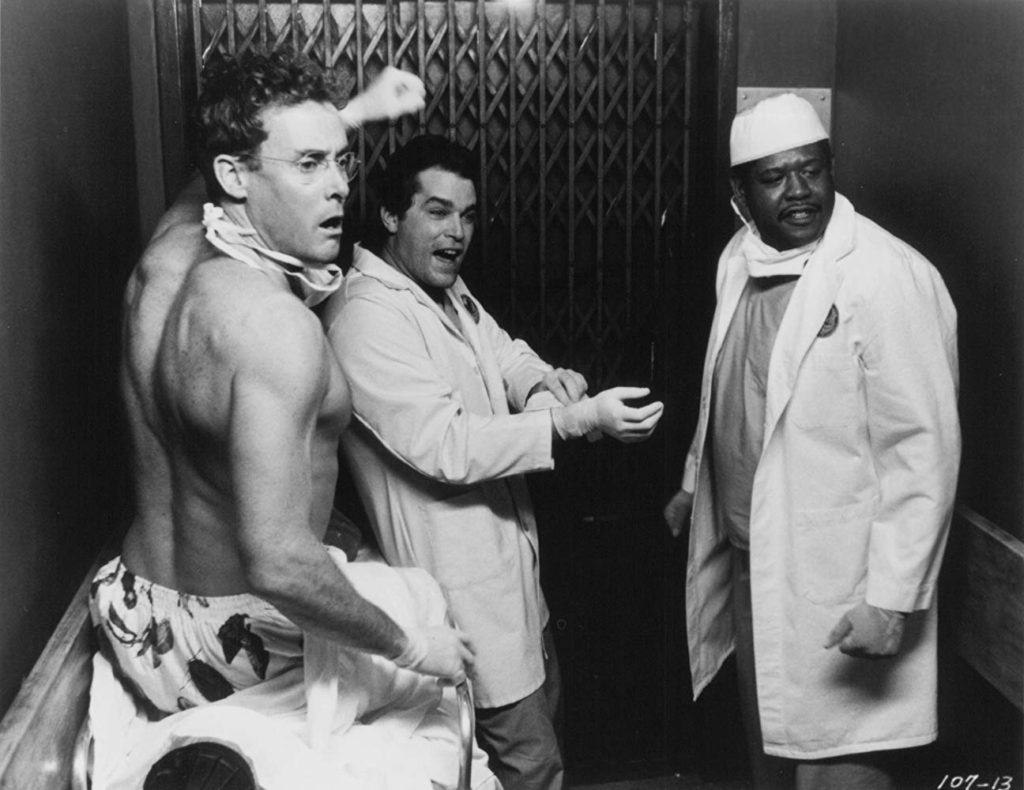
To know that that’s where you’re going to be for x-days, and then you’re going to hop back, that makes a lot of sense actually.
Yeah, plus you get to just stay underwater and keep these creative goggles on, and you don’t come up for air. You go with what you know for a finite period of time. In this case, it was about six months, but do you got something better to do? You’re 29 years old. Go. Burn, baby, burn!
That’s just it. You have been burning and wearing your creative goggles for years now. Decades now, John. I saw you in The Good Catholic and Belko, and in both of those, you just exploded. Two totally different characters. I can’t tell you which one I love more than the other, but you had me riveted to the screen in both. I know with The Good Catholic, I could not wait for Ollie to be back on screen.
I was really proud of the Good Catholic. I said to the young writer/director, Paul Schoulberg, I said, “At some point, we need to see Ollie tell his truth.” And I said, “Whether that’s in a homily, or whether he’s practicing something, but we have to see him tell his truth. Otherwise, he’s just a buffoon, and while he can be the comic relief, there has to be some grounding if we’re going to take him seriously in the third act when he gives somebody their last rites.” So Paul and I wrote that compassioned homily, and it’s all one take. There’s no cuts. It’s about six minutes. It’s one of the best things I’ve ever done and I’m super proud of that movie.
John, I was just riveted to the screen, and during that final scene, that homily and the last rites, my heart, I think it stopped beating. I was so enraptured watching what was unfolding.
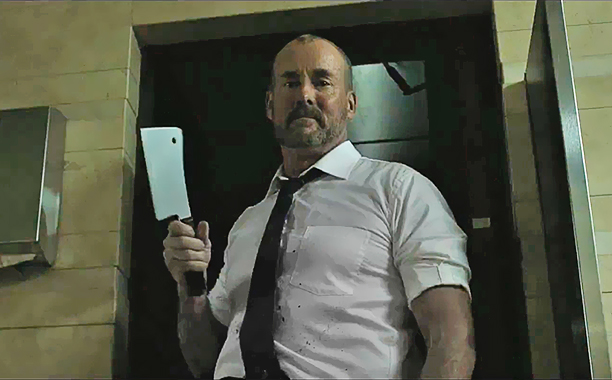
You know what’s interesting about Belko is I had gotten BENCHED about a month before I went down to Bogota to shoot Belko, and so the understanding … Now, there’s a pattern here … But the understanding here is that as soon as I was wrapped on Friday down in Bogota, I would get on a plane Saturday. It’s almost a day and a half up to Nashville. Get there Sunday, do wardrobe, and be ready to go Monday. And what happens with these low budget independents as the new normal is three six-day weeks, and that is indeed what BENCHED was. And because I don’t stop talking for almost 90 minutes in BENCHED, I was in a bit of a panic.
So I met all these new, stunning actors, mostly from Los Angeles who I didn’t know down in Bogota, who comprised the ensemble that was The Belko Experiment. I kidnapped about three of them and I rented a rehearsal space in Bogota. I kidnapped these three different actors, and whenever they weren’t working, and whenever I wasn’t working, I trapped them in my rehearsal space, and I made them go over BENCHED with me. And we did that for almost three months so that I had those words coming out of my ears by the time I came to Nashville. And it’s really the only way you can shoot it because BENCHED is based on a two-person play, so these two guys are on stage. There are no kids in the play, no women. There’s nothing. It’s just these two guys. It’s called a two-hander. And because it’s a two-hander, I don’t stop talking. I initiate everything, and then Garret is a classic reactor in the movie. How great is he?
Fabulous!

So I had these different actors down in Bogota, Colombia, and I kidnapped them. They made BENCHED possible, otherwise, I couldn’t have done it, because I’m a rehearsal pig. Rehearsal is my favorite part of everything, and these people indulged me. One guy, who has now become my acting teacher, Ben Davis, we took BENCHED apart and we put it back together. The words are so magnificent, and I wanted to … Did you get to see BENCHED yet?
Absolutely! I wouldn’t be talking to you if I hadn’t seen it. I love this film. I’m a baseball freak anyway and I love baseball movies. And Little League? That’s a whole other ball game for me, pardon the pun. I love BENCHED. I talked with Garret [Dillahunt] the other day and was telling him this film is so much fun, and it’s your performance and the non-stop dialogue. I’m sure your theater training and all of your stage work come heavily into play for a role like this. Your dynamic with Garret, and watching Coach Don with each of these kids, and you seem so gruff on the exterior, spouting to this one, spouting to that one, but then you have an underlying love and tenderness and concern for each one of them that slowly creeps out. Magnificent nuance and performance. Absolutely flawless.
I loved each one of those young actors like my own son, and the lens … I’ve always told actors the lens is an x-ray machine, and it can see right through you. And while Coach Don is probably a lot rougher than I am, one thing I know is I know love, and I know young men, because I have my son Max, and I was a counselor for, I don’t know, 15 years. And I’ve been an acting coach for 15 years, and my love for those young boys … As much as I tried to be tough on them, the camera’s an x-ray machine. It knows McGinley loves those kids, and that balance, to me, makes the whole movie.

It really does, because when we first meet Coach Don, you’re gruff, you’re rough, and it’s like, “Whoa, this guy is like the bane of existence. He is the horrible sports parent that you hear about.” I have one brother who coached little league for a number of years, even after my nephews had long outgrown it, so I have seen him coach, and I have heard horror stories. But watching this, and the shift … All it takes is just one little pat on the butt or the glove on the shoulder, and it’s there, and it changes the timbre entirely.
Right! You know what we did? You know that great monologue where Garret and I are in the gymnasium, and I tell him about how Billy Nathan got tagged out of third because he wasn’t paying attention, and I never got to have my at-bat? Well, we worked backwards from there. What Richard Dresser [screenwriter] gave us was that monologue, and for Coach Don, we worked backwards from there, but that’s his mandate; that he’s going to protect these kids, so they’re always going to get their at-bat. Whether that’s metaphorical or whether it’s actual, he’s going to make sure they get their at-bat. And when you work backwards with that kind of juice that Richard gives you on the page – and I didn’t rewrite a word of this thing because it was so magnificent – and we worked backwards from that monologue, and it was so profoundly rewarding that I can’t even tell you.
I’m curious, how much rehearsal time you got to have with the kids? Because you were down in Bogota playing with Gunn & Company.
Zero. Zero. I’m telling you, I got there Sunday morning, did wardrobe. We started shooting Monday. And so there was no lying there. I didn’t know any of those kids, but they were young. They weren’t young men. They were boys, and they were magnificent, and I loved them.

They truly were magnificent. The way I’m watching them develop through the course of the film, and I know shooting isn’t that long, but I’m looking at a lot of them and have to wonder, do they play little league? Because some of them have some real skills.
Yeah, they were all very good little league baseball players. Maybe not Timmy, the kid played Timmy, but he was so magnificently cast. I mean, they look like Benetton or Gap kids. They’re so beautiful. And nothing was too much, and we were shooting in that awful irrepressible heat, which is 103 but with 90% humidity, and those kids didn’t gripe once. And we were out on that hot baseball field. They were magnificent.
It shows on the screen. It really does, John. And that’s something that, consistently with your performances, your love of your craft consistently shows on the screen, and it elevates whatever project you are in, be it a television series, a one-off, or something like 42, or Wild Hogs, or Burn Notice. You just elevate what is happening on screen.
They wouldn’t let me in 42. So as fate would have it, the director/writer, Brian Helgeland, lives at the end of my driveway, and so I jumped . . . and I’m sure whoever cast it is never going to talk to me again . . . but I jumped the chain of command, and I went over and knocked on Brian’s door, and I’d said hi to him a couple of times over the years. I said, “Listen, I should be in 42, and I don’t know if you’ve cast Red Barber yet, but I should be Red Barber.” And he said, “Well, okay. I can’t just give it to you. You seem great, but let’s take a couple weeks with some of the material, and then I’ll come over, and do it for me.” So I keep a rehearsal space in Los Angeles, and I’m pretty obsessive compulsive with this stuff, so I rehearsed Red’s sound for three weeks, and as soon as I could do a Shakespeare sonnet and Edgar Allen Poe poem in Red’s cadence, I knew I was ready to do it for Brian. So I brought him over, and I did it for him, and he said, “Oh, great. That’s it. You’re great. You’re Red Barber.” And the big surprise was when I got down to Atlanta, Red was mostly voiceover in the film, and he goes, “No, I decided I want to see you the whole time,” and so I had that night to completely memorize it because I thought it was a voiceover. You know, panic is great for actors, and I went into panic mode and used all my tools, and that’s what came out of it. And it’s some of the best write-ups I’ve ever gotten in my life.
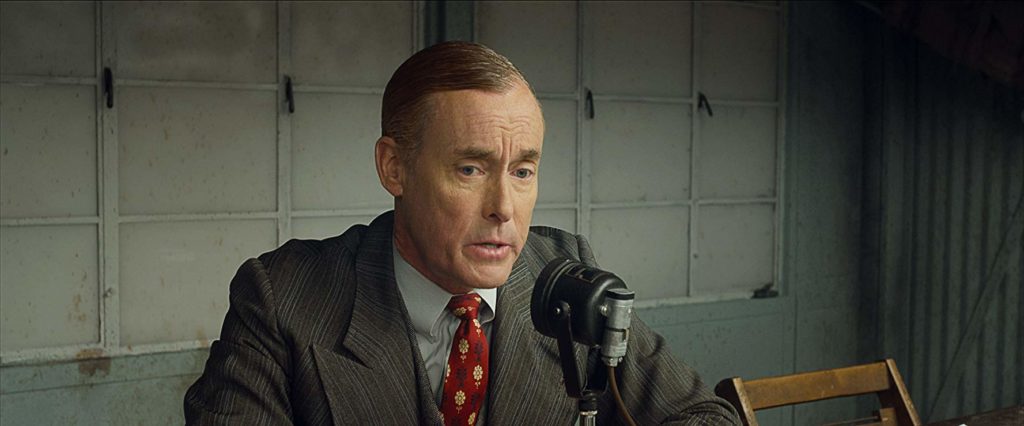
You’re amazing in 42 as Red Barber. You truly are. You did blow my mind. But something that you have done your whole career . . . you’ve done Oliver Stone films, you’ve done the big budget things, but then you always come back to the tried and true little indie gems. The fact that you stepped up to the plate for Kiefer’s [Sutherland] directorial debut with Truth or Consequences, New Mexico, speaks so much about you. Or working with D.B. Sweeney. What is it about the indie films, the indie process, that you relish and cherish so much?
Well, with Kiefer, with Truth or Consequences, New Mexico, I think he had Harvey Keitel or somebody, some great actor, and that person fell out over the weekend. I had become really good friends with Kiefer in Kansas City when we were shooting Article 99, and the phone rang on a Monday morning, and Kief was in a panic. He was directing his first film. He said, “Will you come out to Salt Lake and just do a day on my film?” I hadn’t read the script, and I said, “What happens?” And he says, “You’re a boss, and Vincent gets to shoot you.” I’m like, “I’ll be there tomorrow afternoon.” So I flew to Salt Lake, and I did that for Kief, and I’d do that again tomorrow if he asked me to. But the answer to your question is most indies, like The Good Catholic, like BENCHED, those are not conventional, money-making scripts. They’re not going to make $100 million, although The Good Catholic did very well. And I’ve always chased words my whole life. That’s what shakes me. I’m a slave to the playwright, and I’m a slave to the screenwriter, and I’ve been lucky enough to be around David Mamet, and Bill Lawrence, and Roland Joffe, and some of these great young writers, and Academy award-winning writers, and Oliver [Stone], and I want to hue to the word on the page, and usually the word on the page in independent films are pretty astonishing. And that’s what I want to be a part of.
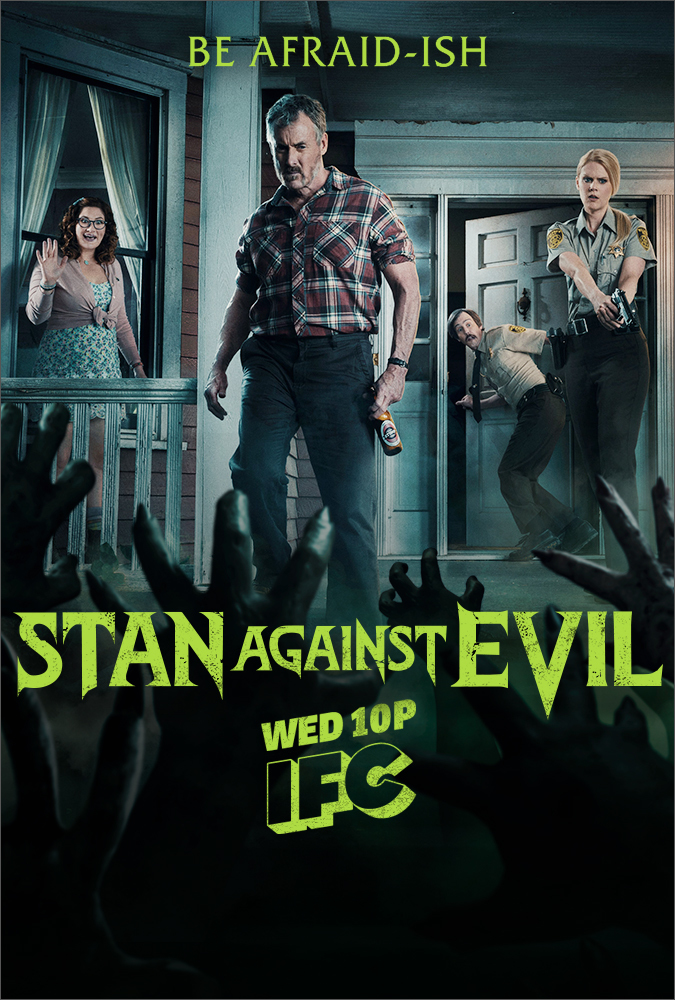
Do you ever plan on stepping behind the camera, John, and devoting time there?
I’ve produced five movies, and I’ve produced a TV series that we’re doing now called Stan Against Evil and so I’d rather control the purse strings, and that’s what I get to do as a producer. You’ll want me as a producer. I’m just going to make your life so much easier. An example was on Are We Done Yet?. Ice Cube was the actor/producer, and that was the best run set I’ve ever been on in my life, and I learned a lot from Cube because they were 12 hour days, and not 16 hour days. Everybody shows up. You exercise respect and love on the set, and you get the work done. And this is not brain surgery. Bill Lawrence instituted the “No Asshole Policy on Scrubs. The first year he got everyone into the cafeteria, the 160 people on the crew, and this is not a confrontational guy. He’s the Norman Lear of his generation, and he just said, “On this set, we’re not going to tolerate assholes,” and all he meant was be respectful. You don’t have to walk on pins and needles. You don’t have to watch your shadow, so just be respectful. And I’ve instituted that on Stan Against Evil. Whatever I’m producing, whenever I’m in a position to institute mandates like this, I institute the “No Asshole Policy” and it yields profound dividends. Everybody knows what I’m talking about. I’m not talking about “mind your p’s and q’s,” I’m just talking about be nice or be gone.
How does it challenge you, or how does it change your work ethic or the process when you’re working on a film like BENCHED, where it is all kids? You and Garret are essentially the only real adults, and then it’s all kids, so you’ve got union limitations, you’ve got hourly limitations, you’ve got parents. Does this impact your performance or your process at all?
No, I teach people from time to time for 15 years or so, and so like, the perfect example is when I go out to the pitching mound, and I give Timmy that pep talk. I got to work with him for ten or 15 minutes before we did the scene, and it just took the sting off it for him, because he was really nervous, and he didn’t know what was going on. It just kind of gave him his bearings and gave him a couple of tools. And he’s magnificent in that scene. He just glows. It enhances what I get to do when you can get everybody on the same frequency.

And, of course, then there’s you opposite Graham Schneider as Coach Dan’s son Jimmy . . . Some priceless moments there. Simply priceless moments.
He was fantastic. We had to keep the one take where I didn’t completely fall apart in the truck because it was too much. But there were a lot of things. Oh God! I’m getting caught up just thinking about it. There were a lot of things percolating in that scene and some had to do with my son, some had to do with the text. The camera is an x-ray machine, and it could see John McGinley telling his truth.
I got teary in that scene. The scene in the van between the two of you, but it was so believable. There wasn’t a moment I did not believe he was not your real son.
Me, too.
John, you have given so many gifts to all of us with all of your great performances. You’re teaching acting, you’re working with other actors and helping them. What does all of this, what does this business, this crazy business, filmmaking, stage acting, television acting … What does it give you? What is the gift it gives to you?
Over the years, the biggest gift it’s given me is to be able to advocate for people with special needs. My son Max was born almost 21 years ago. Max was born with Down’s Syndrome and I’ve become a pretty fanatical advocate for the Down’s Syndrome community. With the amount of exposure that I’ve been lucky enough to get, I’ve been able to become a voice for the special needs community and advocate for people who can’t advocate for themselves. And that’s not a burden. That’s a privilege. And it’s something I try to do every single day.

You are known for your devotion and your advocacy and I think it is one of the most remarkable things. It is always such a privilege with Special Olympics to see you helping out, doing things, lending your voice, and I know it comes from your heart.
The funniest thing happened in June. Every year my brothers and I, when my father was alive, it used to be the four of us, but now we bring our cousin, the four of us go over to Ireland to play golf, and have a pint of beer, and lie about how great we used to be. And this year, we decided we’d go down the southwest to Cork and Killarney and Kerry, where we’ve been before, but we wanted to do it again. And I read a book called Dead Wake by Erik Larson, and Dead Wake is about the sinking of the Lusitania. The Lusitania was sunk two miles off of a town in Cork called Kinsale, and so I said, “Hey, you guys, everyone, we should all read this book, and then we should hire a boat, a large boat to take us out, and let’s hear stories about all these sunken boats off of Kinsale.” And so I got on the internet, and I found a Kinsale tourist boat thing, and I sent the guy a note. His name is Carroll and he’s about 70 years old, and I saw his picture on the internet, and he was the perfect guy. He’s who you want just to sow all these Irish stories. So we started having an email relationship, and he said, “Now, wait a minute, are you John McGinley the actor?” And I wrote back, “Yeah.” And he goes, “Oh, my mother,” … He’s 70, so his mother must be 80. [laughing] He goes, “My mother knows you because of your Down’s Syndrome advocacy.” And I’m like, “I love you, Carroll, because that’s all I want to be known for.”

John, you will be known for so much more than that, and so many more things to come in the future. I have no doubt. You truly are one of the sparkling diamonds out there, and I mean that from my heart. I can’t thank you enough for taking time to talk to me today about BENCHED, and so many other things. Besides Stan Against Evil, is there anything else coming up that I can look for? Because you know I cannot miss anything of yours!
No. Because I’m the producer on Stan Against Evil, I’m in the editing bay all day. We’ve cut six of them, and now we’ve got network notes. We’ll chop two more. We had a great ComiCon a week ago down in San Diego. And now as soon as we get these eight done, and polished up, and we’ll sweeten them with music and effects, then we’ll travel to New York and go to the New York ComiCon in October, and then season three’s on Halloween. My dance card’s full right now!
Wow! Well, one day, you need to lessen your dance card and take a few more trips to Ireland.
Well, we don’t miss those! I’ve turned down movies over the trip to Ireland, and I am not being arrogant. I am just telling my truth. I’ve turned down movies. I just turned down an arc on a TV show, and they were like, “Well, you’ve got to be here the last couple weeks of August,” and I was like, “Eeeeeerrrhhh, no, I don’t.” And then the first thing everybody says is, “What do you want, more money?” And I’m like, “No, I get all the money I need. I’m going to be in Kinsale with Carroll. That’s where I’m going to be!” Trust me, it’s my ballast.
by debbie elias, interview 8/6/2018











